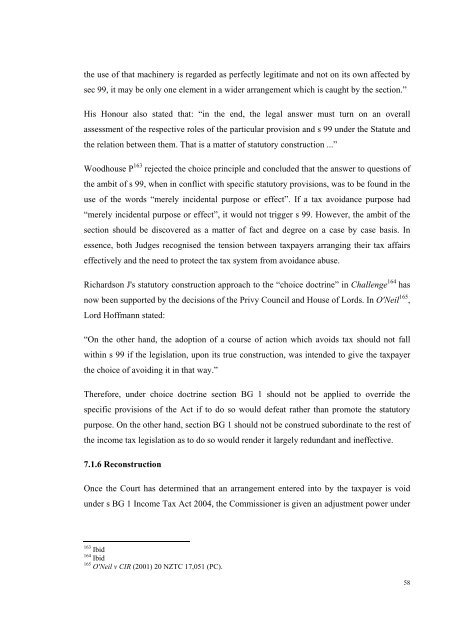Tax Avoidance: Causes and Solutions - Scholarly Commons Home
Tax Avoidance: Causes and Solutions - Scholarly Commons Home
Tax Avoidance: Causes and Solutions - Scholarly Commons Home
Create successful ePaper yourself
Turn your PDF publications into a flip-book with our unique Google optimized e-Paper software.
the use of that machinery is regarded as perfectly legitimate <strong>and</strong> not on its own affected by<br />
sec 99, it may be only one element in a wider arrangement which is caught by the section.”<br />
His Honour also stated that: “in the end, the legal answer must turn on an overall<br />
assessment of the respective roles of the particular provision <strong>and</strong> s 99 under the Statute <strong>and</strong><br />
the relation between them. That is a matter of statutory construction ...”<br />
Woodhouse P 163 rejected the choice principle <strong>and</strong> concluded that the answer to questions of<br />
the ambit of s 99, when in conflict with specific statutory provisions, was to be found in the<br />
use of the words “merely incidental purpose or effect”. If a tax avoidance purpose had<br />
“merely incidental purpose or effect”, it would not trigger s 99. However, the ambit of the<br />
section should be discovered as a matter of fact <strong>and</strong> degree on a case by case basis. In<br />
essence, both Judges recognised the tension between taxpayers arranging their tax affairs<br />
effectively <strong>and</strong> the need to protect the tax system from avoidance abuse.<br />
Richardson J's statutory construction approach to the “choice doctrine” in Challenge 164 has<br />
now been supported by the decisions of the Privy Council <strong>and</strong> House of Lords. In O'Neil 165 ,<br />
Lord Hoffmann stated:<br />
“On the other h<strong>and</strong>, the adoption of a course of action which avoids tax should not fall<br />
within s 99 if the legislation, upon its true construction, was intended to give the taxpayer<br />
the choice of avoiding it in that way.”<br />
Therefore, under choice doctrine section BG 1 should not be applied to override the<br />
specific provisions of the Act if to do so would defeat rather than promote the statutory<br />
purpose. On the other h<strong>and</strong>, section BG 1 should not be construed subordinate to the rest of<br />
the income tax legislation as to do so would render it largely redundant <strong>and</strong> ineffective.<br />
7.1.6 Reconstruction<br />
Once the Court has determined that an arrangement entered into by the taxpayer is void<br />
under s BG 1 Income <strong>Tax</strong> Act 2004, the Commissioner is given an adjustment power under<br />
163 Ibid<br />
164 Ibid<br />
165 O'Neil v CIR (2001) 20 NZTC 17,051 (PC).<br />
58

















